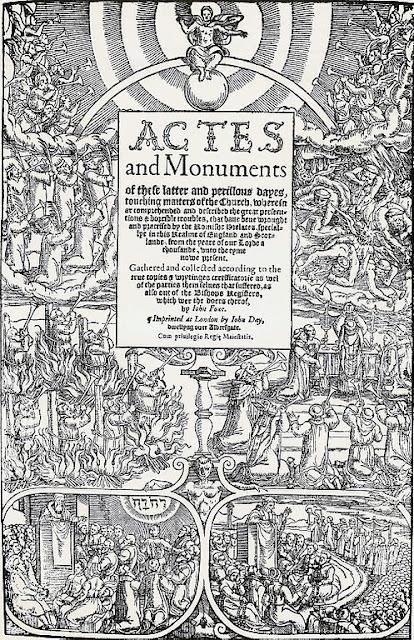Chapter XII
The Rev. John Cardmaker and John Warne.
May 30, 1555, the Rev. John Cardmaker, otherwise called Taylor, prebendary of the church of Wells, and John Warne, upholsterer, of St. John's, Walbrook, suffered together in Smithfield. Mr. Cardmaker, who first was an observant friar before the dissolution of the abbeys, afterward was a married minister, and in King Edward's time appointed to be reader in St. Paul's; being apprehended in the beginning of Queen Mary's reign, with Dr. Barlow, bishop of Bath, he was brought to London, and put in the Fleet prison, King Edward's laws being yet in force. In Mary's reign, when brought before the bishop of Winchester, the latter offered them the queen's mercy, if they would recant.
Articles having been preferred against Mr. John Warne, he was examined upon them by Bonner, who earnestly exhorted him to recant his opinions. To whom he answered, I am persuaded that I am in the right opinion, and I see no cause to recant; for all the filthiness and idolatry lies in the church of Rome.
The bishop then, seeing that all his fair promises and terrible threatenings could not prevail, pronounced the definitive sentence of condemnation, and ordered the 30th of May, 1555, for the execution of John Cardmaker and John Warne, who were brought by the sheriffs to Smithfield. Being come to the stake, the sheriffs called Mr. Cardmaker aside, and talked with him secretly, during which Mr. Warne prayed, was chained to the stake, and had wood and reeds set about him.
The people were greatly afflicted, thinking that Mr. Cardmaker would recant at the burning of Mr. Warne. At length Mr. Cardmaker departed from the sheriffs, and came towards the stake, knelt down, and made a long prayer in silence to himself. He then arose up, put off his clothes to his shirt, and went with a bold courage unto the stake and kissed it; and taking Mr. Warne by the hand, he heartily comforted him, and was bound to the stake, rejoicing. The people seeing this so suddenly done, contrary to their previous expectation, cried out, God be praised! the Lord strengthen thee, Cardmaker! the Lord Jesus receive thy spirit! And this continued while the executioner put fire to them, and both had passed through the fire to the blessed rest and peace among God's holy saints and martyrs, to enjoy the crown of triumph and victory prepared for the elect soldiers and warriors of Christ Jesus in his blessed kingdom, to whom be glory and majesty for ever. Amen.
John Simpson and John Ardeley.
John Simpson and John Ardeley were condemned on the same day with Mr. Cardmaker and John Warne, which was the 25th of May. They were shortly after sent down from London to Essex, where they were burnt in one day, John Simpson at Rochford, and John Ardeley at Railey, glorifying God in his beloved Son, and rejoicing that they were accounted worthy to suffer.
Source: https://www.gutenberg.org/
